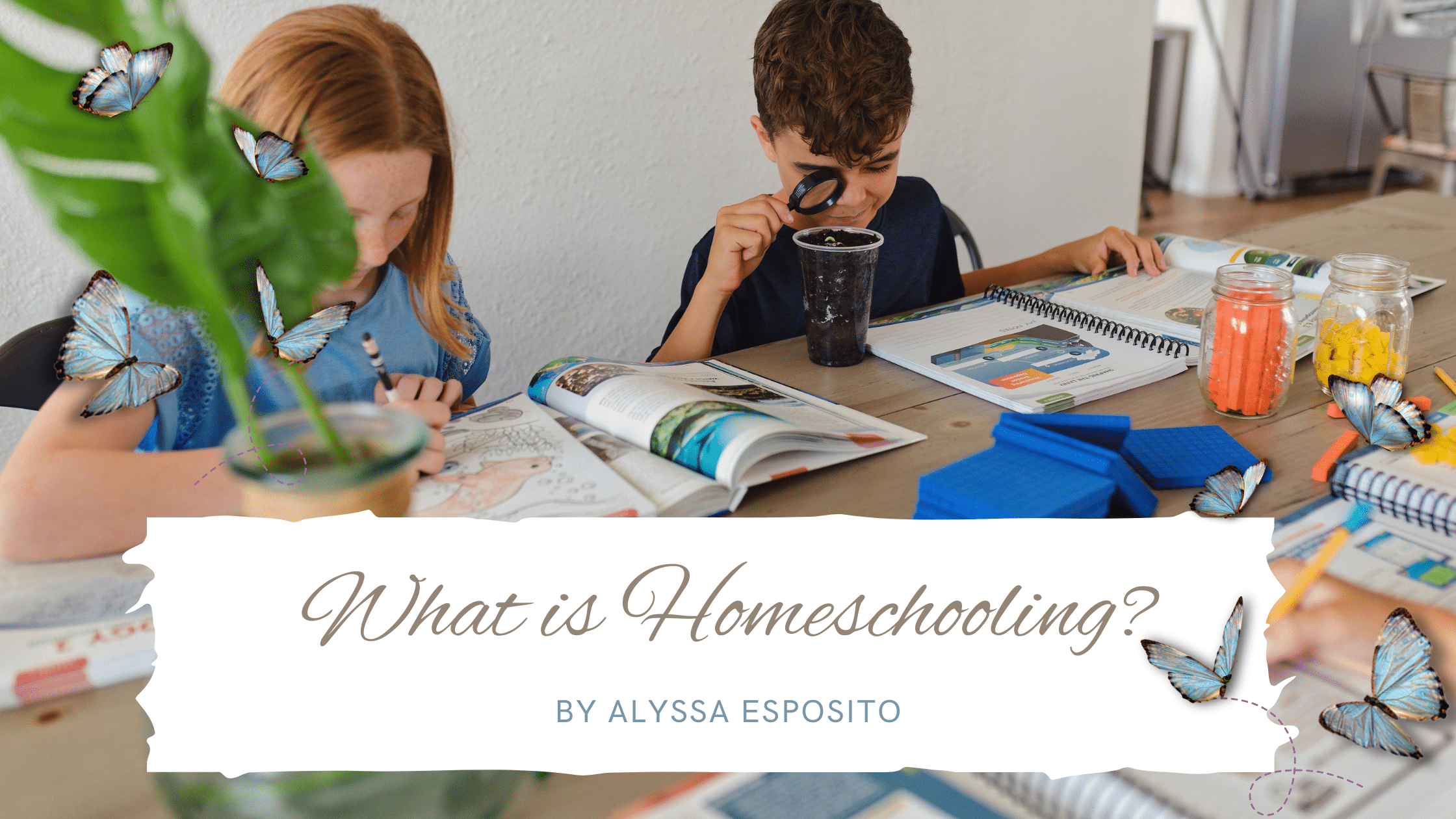
What is Homeschooling?
You’ve heard the stories about the homeschooled kids who live somewhere on your block. Maybe you’ve heard that they “run wild” or that they’re brainiacs attending college at the age of 12, but can’t interact with other kids their age. The rumor train is a wild ride.
In truth, many homeschoolers spend a lot of time outside. But with their parent/teacher home with them, it’s unlikely they’re running wild. They’re probably exploring their backyard and learning about nature. And while an occasional homeschooler may test out of several classes and attend college earlier than most, regardless of the school environment, it would be uncommon. They are likely just taking college-level courses like your high schooler is take AP Biology. And while some homeschoolers are shy or awkward, there is a large number of kids in public and private schools who aren’t exactly “popular.” I know I wasn’t!
So, upon realizing that these gossip trains are likely a far cry from the truth, you may wonder then, “What is homeschooling?”
What is Homeschooling?
Dictionary Definition:
The Oxford Learner’s Dictionary defines homeschooling as a noun – the practice of educating children at home, not in schools.
If you want to break it down further, the Oxford Dictionary defines:
- Practice – n. the actual application or use of an idea, belief…
- Education – n. the process of receiving or giving systematic instruction, especially at a school or university.
So, if homeschooling is the application of an educational philosophy (an idea or belief) where children are systematically instructed at home, then what is that philosophy?
That’s a great question. It depends on who you ask! Each parent or set of parents in an individual home runs their respective homeschool. Sure, the state or local governments set certain requirements and benchmarks, but the teacher, AKA the parent, determines how to run their homeschool.
Core Principles and Values
Generally, families opt for homeschooling because they can follow a customizable educational philosophy.
Homeschooling families are drawn to the idea of being able to tailor their students’ education. This may be because their students have learning challenges, are extremely bright, have a specific passion they want to focus on, or they want to instill (or shield their children from) values of a specific social, religious, or political worldview. Students who spend the majority of their days at home have the distinct advantage and opportunity to be raised with the values of their families and be shielded from exposure to worldly things too early.
How Does Homeschooling Work?
Now that you understand the philosophy behind homeschooling, you may wonder, “How does it work?”
Legal Regulations for Homeschooling
All 50 states allow homeschooling, but New York, Pennsylvania, Massachusetts, Rhode Island, and U.S. territory, American Samoa, have the highest homeschooling restrictions across America.
Each state has different requirements and regulations for homeschooling families. Parents must inform the local governments of their homeschooling plans in many states. Some states require some form of end-of-year testing. Others require you to submit the curriculum choices you’ve made for the upcoming school year. The best way to learn about your state’s specific rules is through the Home School Legal Defense Association.
Homeschooling Methods
There are approximately 10 widely recognized homeschooling methods.
- Box Curriculum– An all-in-one, use-as-is, curriculum set separated by grade
- Classical– A very structured approach with Socratic discussion, memorization, reading, and a three-part strategy for training the mind, beginning with absorbing facts, moving on to learning to think on your own, and finally ending with learning to express your thoughts.
- Montessori– A child-led, hands-on method involving a predictable routine, multi-age learning, and learning through life experiences.
- Waldorf– An artistic and hands-on teaching approach with topics set on a seven-year cycle
- Unit Study– Involves centering the learning (in all subjects) around a particular topic of interest
- Unschooling– A student-directed method that involves exploration and experiencing the world – no tests, no curriculum, and no set schedule.
- Multiple Intelligences– A method that involves focusing on the learning style or bent of the child, and tailoring their education to suit that strength
- Eclectic– This method is a blend of multiple other homeschooling methods.
- Charlotte Mason– A teacher-guided and self-directed method in a peaceful environment, with a whole-person educational approach. Nature-focused, hands-on activities and engaging books. (Apologia uses this method.)
Equipment
Within the question of “how does it work?” you may wonder what a parent needs to homeschool. That depends on the method you choose and the learning styles of your students. But here are a list of the big ones.
Books
Apologia supports encouraging a love of reading. Because of that, our curriculum uses a Charlotte Mason style, which features colorful textbooks written in a conversational tone and an open-and-go teaching style.
Digital Products
Self-Paced Courses
In the modern world, technology is everywhere. While Apologia encourages young children to explore, read, and get hands-on, we offer numerous technology-based educational options for middle and high-school-aged kids.
Self-Paced Courses – Self-paced, online homeschool courses offer a digital version of Apologia’s award-winning curricula. These online homeschool courses help build students’ independence, freeing up your teaching time so you can focus on other students or courses in your homeschool. Self-paced courses include the following:
-
- Textbook – Students receive access to a digital version of the textbook for their course.
- Audiobook – An audio narration of the textbook enhances online reading and is beneficial for auditory learners or students with reading difficulty.
- Video Lessons – Instructor Sherri Seligson provides video lessons throughout each module to strengthen students’ learning of the concepts presented in the course.
- Hands-on Experiments – Easy-to-do, at-home experiments are featured via video lessons to help students conduct hands-on experiments themselves.
- Review Questions and Answers – Independent review questions and answers and a Study Guide are included in each module to allow students to practice the concepts taught and prepare for end-of-module tests.
- AutoGrade+ – AutoGrade+ provides dynamic online testing for Apologia courses with multiple attempts, immediate answer feedback, and automatic grade recording.
Live Online Classes
Apologia Live Classes provide dynamic, interactive lessons led by qualified instructors with no parent grading or instruction required. Students participate in scheduled live sessions via a virtual classroom platform, engaging in real-time with peers and experienced instructors. Classes are designed to be interactive, encouraging discussion and active learning. Sessions are recorded, allowing students to review material as needed or catch up on any class they missed live. The student portal and study site are accessible 24/7, providing access to the class syllabus, notes, assignments, tests, quizzes, audio and video clips, discussions, and more anytime.
Assignments, tests, quizzes, and papers are graded by the teacher, saving time for parents and providing students with valuable feedback. This feedback is crucial for students to understand their strengths and weaknesses and to improve their performance in future assessments. Additionally, it allows parents to track their child’s progress and provide support and guidance as needed.
Videos
Apologia offers a dynamic homeschool video curriculum designed to complement your child’s homeschool experience. With our video homeschool curriculum, students can engage with expert instructors and enjoy interactive lessons that go hand-in-hand with our faith-based curriculum materials.
Audiobooks
Apologia offers homeschool audiobooks to make learning more flexible and engaging for those who prefer auditory learning. Our audiobooks allow students to engage with lessons through listening, offering a flexible solution for busy homeschool families. Our audiobooks will enhance your child’s learning experience alongside our elementary, middle school, and high school curricula.
eBooks
Apologia offers a selection of homeschool eBooks designed to make faith-based learning more accessible and flexible. These digital resources provide a convenient way for students to engage with Apologia’s curriculum, covering a variety of subjects.
Hands-On Equipment
- Lab Equipment– Homeschool science lab equipment plays a pivotal role in fostering hands-on, experiential learning for students within the comfort of their own homes. These essential tools enable a dynamic exploration of scientific concepts, encouraging a deeper understanding of subjects like biology, chemistry, and physics. Apologia’s quality science lab equipment will equip your student with the tools they need to complete the labs in their science courses.
- Household items for manipulatives – Apologia’s courses include lots of hands-on activities and experiments. But before you say, “No way!” our curriculum uses household items that are easily found at a typical grocery store.
The Most Common Question About Homeschool- What About Socialization?
The question of proper socialization for homeschoolers is probably the most common question and concern. In a world where most kids spend six hours a day in public school, homeschooling parents can ensure socialization in a variety of practical and intentional ways.
Family
Siblings not only have peers to interact with 24/7, but they also have time to develop close bonds. Schools separate students by age, so siblings spend most of their waking hours away from each other. Families can foster deep bonding by creating spaces for quality time, not just during homeschool hours, but as a family as a whole.
Neighbors
There are likely many kids within just a few blocks of your house that your students can play and interact with. Long gone are the days when you could send your kids out to play and come back when it gets dark. However, you can get to know your neighbors and look for families you trust to spend time with your kids.
Church
Families rooted in a church community usually find themselves there more than just on Sunday mornings. The more you are there, the more chances your students will have to interact and bond with their peers.
Extra-Curricular Activities
Do your students have an interest in ballet, football, swimming, gymnastics, or chess? Find ways to get your students involved with kids who share similar interests. These are great opportunities for scheduled social time, your students can count on, and a way to learn skills that ensure they grow up to be well-rounded individuals.
Co-Ops
Co-Ops are when homeschooled kids come together under the instruction of another parent/teacher for a class, often held in a church. Kids get to connect with other homeschooled kids and experience a classroom setting.
If you ask one hundred homeschoolers what their homeschool looks like, you’re likely to get one hundred different answers. So, what is homeschooling?
Homeschooling is:
Freedom.
Joy.
Independence.
Exploration.
Tailored.
Effective.
Inspiring.
Adventure.
Togetherness.



